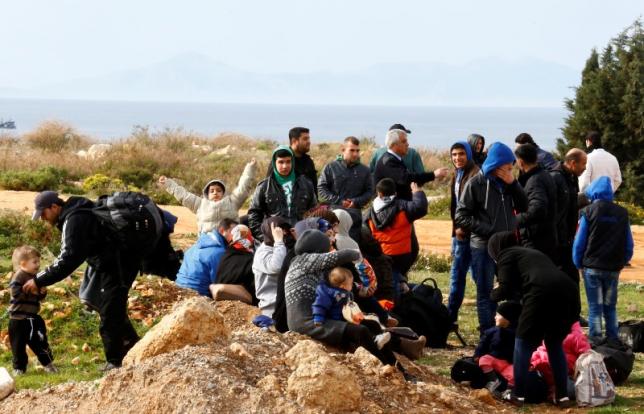
Syrian refugees wait on a roadside after Turkish police prevented them from sailing off to the Greek island of Farmakonisi by dinghies, near a beach in the western Turkish coastal town of Didim, Turkey, March 9, 2016. REUTERS/Umit Bektas
Turkey is not planning to ask for new demands at a meeting with EU leaders on the migrant crisis, Reuters cited a senior Turkish official on Thursday. He described the chances of concluding a deal as difficult but not impossible.
The official also expressed Turkey’s willingness to discuss new proposals from the European side, adding that countries including Cyprus should not be allowed to block progress.
“It will be hard to get a result from this summit, but not impossible. The reason is there are too many actors on the EU side,” the official told Reuters, speaking on condition of anonymity ahead of the sensitive talks.
“Some countries should not be allowed to exhibit a manner that would block progress,” the official said, when asked whether a lingering feud between Ankara and small but vocal EU member Cyprus was hampering a deal.
Tensions between Cyprus and Turkey may derail the whole deal. Davutoglu response to a vague offer to open new “chapters” of Turkey’s slow negotiations to join the EU at some distant future date is highly anticipated.
Cyprus has repeatedly blocked this idea over Turkey’s refusal to give it the same rights as other EU states in access to Turkish ports and airports – a result of the 42-year dispute since the violent partition of the island into a Greek-speaking state and a Turkish-speaking north recognized only by Turkey.
Cypriot President Nicos Anastasiades said he will not lift his veto on Turkish accession chapters unless Ankara ends its refusal to recognize Cyprus. Turkey wants concessions for its northern Cypriot allies in return. The EU and world powers are keen not to derail U.N. talks that could reunite the island.
European Council President Donald Tusk’s draft says the EU would work with Turkey to “prepare for a decision” on opening new accession chapters “as soon as possible” – an obscure prospect Davutoglu may not appreciate.
But in his invitation letter, Tusk stressed that only if the migrant deal could help advance the broader talks on ending the long confrontation with Cyprus, could it hope to succeed.
To satisfy EU and international law, Greece and Turkey will have to modify domestic legislation so that Turkey is regarded as protecting asylum seekers in line with the Geneva Convention, even though Ankara limits its formal commitments to that treaty.
EU officials argue that the alternative to holding people back in Turkey is to see a further build-up of migrants marooned in worsening conditions in Greece, whose European neighbors have closed their borders. Already over 40,000 are stranded.
Legal gymnastics, and the scorn of U.N. and other rights bodies, aside, the deal foresees all those arriving having a right to state their case for asylum and to appeal.
EU leaders meet in Brussels on Thursday to agree on a deal to offer Turkey the following day that would secure Ankara’s commitment to a scheme intended to halt migrant flows to the Greek islands.
A breakfast is set for Friday with Turkish Prime Minister Ahmet Davutoglu, where European Council President Donald Tusk hopes to finalize the deal that the Turkish premier first sprang on the EU, with backing from German Chancellor Angela Merkel, at a special summit 10 days ago.
A separate official in Davutoglu’s office said there was “no hesitation” on the Turkish side about going to Brussels, in response to a question on whether the Turkish delegation would only attend if it was sure of securing a deal.
The first official said a visit by Tusk to Ankara this week had not completely resolved issues over the agreement, but that it had been an “extremely important” visit and that it was vital to maintain the flow of communication.
